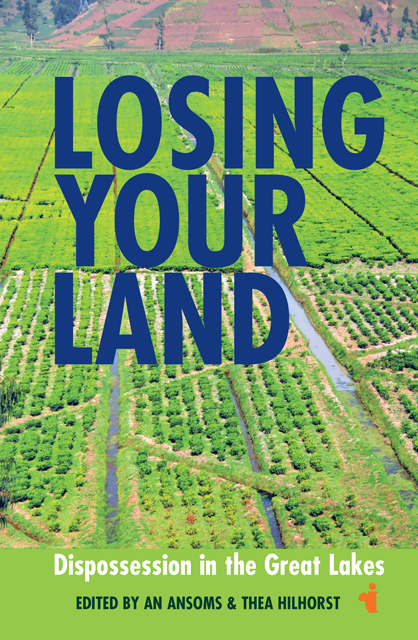Book contents
- Frontmatter
- Contents
- List of Illustrations
- Notes on Contributors
- Acknowledgements
- List of Abbreviations & Acronyms
- 1 Introduction: Causes & Risks of Dispossession & Land Grabbing in the Great Lakes Region
- 2 Land Grabbing & Development History: The Congolese Experience
- 3 This Land is My Land: Land Grabbing in Ituri (DRC)
- 4 Land Grabbing by Mining Companies: Local Contentions & State Reconfiguration in South Kivu (DRC)
- 5 Competition over Soil & Subsoil: Land Grabbing by Local Elites in South Kivu (DRC)
- 6 The Continuities in Contested Land Acquisitions in Uganda
- 7 Land Grabbing & Power Relations in Burundi: Practical Norms & Real Governance
- 8 Land Grabbing & Land Tenure Security in Post-Genocide Rwanda
- 9 The Reorganization of Rural Space in Rwanda: Habitat Concentration, Land Consolidation & Collective Marshland Cultivation
- 10 ‘Modernizing Kigali’: The Struggle for Space in the Rwandan Urban Context
- Conclusion
- Index
9 - The Reorganization of Rural Space in Rwanda: Habitat Concentration, Land Consolidation & Collective Marshland Cultivation
Published online by Cambridge University Press: 24 February 2023
- Frontmatter
- Contents
- List of Illustrations
- Notes on Contributors
- Acknowledgements
- List of Abbreviations & Acronyms
- 1 Introduction: Causes & Risks of Dispossession & Land Grabbing in the Great Lakes Region
- 2 Land Grabbing & Development History: The Congolese Experience
- 3 This Land is My Land: Land Grabbing in Ituri (DRC)
- 4 Land Grabbing by Mining Companies: Local Contentions & State Reconfiguration in South Kivu (DRC)
- 5 Competition over Soil & Subsoil: Land Grabbing by Local Elites in South Kivu (DRC)
- 6 The Continuities in Contested Land Acquisitions in Uganda
- 7 Land Grabbing & Power Relations in Burundi: Practical Norms & Real Governance
- 8 Land Grabbing & Land Tenure Security in Post-Genocide Rwanda
- 9 The Reorganization of Rural Space in Rwanda: Habitat Concentration, Land Consolidation & Collective Marshland Cultivation
- 10 ‘Modernizing Kigali’: The Struggle for Space in the Rwandan Urban Context
- Conclusion
- Index
Summary
Any attempt to completely plan a village, a city, or, for that matter, a language is certain to run afoul of the same social reality. A village, city, or language is the jointly created, partly unintended product of many, many hands. To the degree that authorities insist on replacing this ineffably complex web of activity with formal rules and regulations, they are certain to disrupt the web in ways they cannot possibly foresee. (Scott, 1998: 256)
Introduction
‘How do Rwandans envisage their future? What kind of society do they want to become? What are the transformations needed to emerge from a deeply unsatisfactory social and economic situation?’ These are the promising opening questions of the Rwandan Vision 2020 document, which was finalized in July 2000 (GOR – Government of Rwanda, 2000). In the early years of the new millennium, ambitions for economic growth within Rwandan government circles primarily concentrated on the service sector. The first Rwandan PRSP (Poverty Reduction Strategy Paper) actually contended that there was a window of opportunity ‘to leap-frog the stage of industrialisation and transform [Rwanda’s] subsistence economy into a service-sector driven, high value-added information and knowledge-based economy that can compete on the global market’ (GOR, 2002: 69). With time, however, policymakers have become increasingly aware of the small likelihood of a knowledge-based service sector absorbing a massive unskilled labour force previously employed in agriculture. Hence, the Rwandan government has turned to agriculture as the main engine of economic growth (see for example EDPRS – Economic Development & Poverty Reduction Strategy 2008-2012 and EDPRS 2012-2016).
In fact, Rwandan policymakers’ attention to the agricultural sector is justified: agriculture represents the main economic activity in the country, and it is a source of livelihood for about eighty per cent of the populations (GOR, 2012). However, the way in which benefits and wealth created by agricultural-led growth impact upon the population, depends on how the primary sector is ‘upgraded’. The Strategic Plan for the Transformation of Agriculture (SPAT) outlines an operational framework for agricultural sector development. The document focuses on agricultural modernization, intensification, professionalization and enterprise development (GOR, 2004a). The government introduced policies for promoting monocropping and regional crop specialization, land registration and agricultural plot consolidation, combined with a market-oriented approach to be adopted in all the sector’s productive activities (MINAGRI – Ministry of Agriculture and Animal Resources, 2011).
- Type
- Chapter
- Information
- Losing your LandDispossession in the Great Lakes, pp. 163 - 185Publisher: Boydell & BrewerPrint publication year: 2014
- 8
- Cited by



